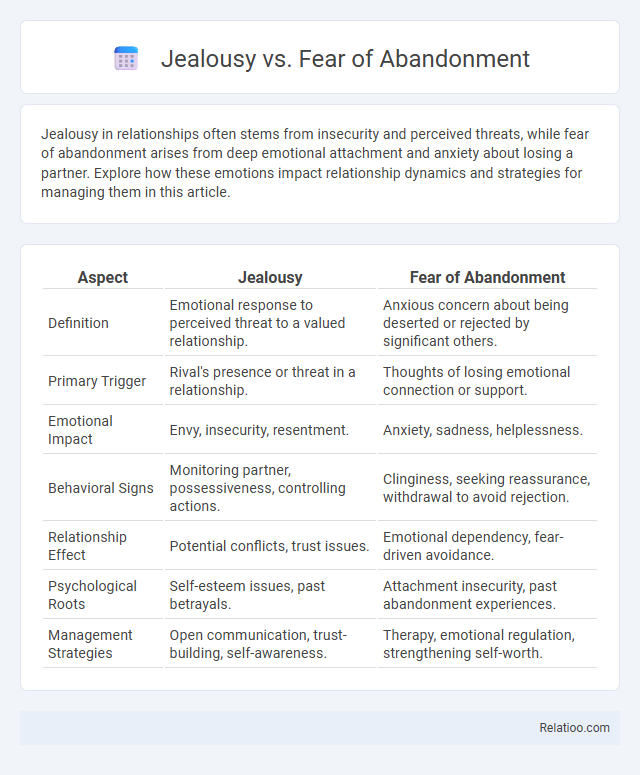Jealousy in relationships often stems from insecurity and perceived threats, while fear of abandonment arises from deep emotional attachment and anxiety about losing a partner. Explore how these emotions impact relationship dynamics and strategies for managing them in this article.
Table of Comparison
| Aspect | Jealousy | Fear of Abandonment |
|---|---|---|
| Definition | Emotional response to perceived threat to a valued relationship. | Anxious concern about being deserted or rejected by significant others. |
| Primary Trigger | Rival's presence or threat in a relationship. | Thoughts of losing emotional connection or support. |
| Emotional Impact | Envy, insecurity, resentment. | Anxiety, sadness, helplessness. |
| Behavioral Signs | Monitoring partner, possessiveness, controlling actions. | Clinginess, seeking reassurance, withdrawal to avoid rejection. |
| Relationship Effect | Potential conflicts, trust issues. | Emotional dependency, fear-driven avoidance. |
| Psychological Roots | Self-esteem issues, past betrayals. | Attachment insecurity, past abandonment experiences. |
| Management Strategies | Open communication, trust-building, self-awareness. | Therapy, emotional regulation, strengthening self-worth. |
Understanding Jealousy: Definition and Roots
Jealousy is a complex emotion rooted in insecurity, possessiveness, and fear of losing something or someone valuable to you. Unlike the fear of abandonment, which centers on the anxiety of being left alone or rejected, jealousy often stems from perceived threats to relationships or self-esteem. Recognizing these differences helps you better understand your emotional responses and address underlying issues effectively.
Defining Fear of Abandonment
Fear of abandonment is a deep-seated emotional response characterized by anxiety over losing close relationships or being left alone. Unlike jealousy, which revolves around insecurity about potential rivalry or loss of attention, fear of abandonment centers on the dread of being permanently forsaken or rejected. Understanding your fear of abandonment helps in addressing emotional vulnerabilities and fosters healthier relationship dynamics.
Key Differences Between Jealousy and Fear of Abandonment
Jealousy involves a reaction to perceived threats to a valued relationship, often triggered by the presence of a rival or competition, whereas fear of abandonment centers on the anxiety of being left or rejected by loved ones, regardless of external threats. Jealousy typically encompasses emotions such as envy and protectiveness tied to specific individuals, while fear of abandonment stems from deeper insecurities about loss and emotional neglect. Understanding these differences is crucial in addressing relationship dynamics and emotional responses effectively.
Psychological Triggers for Jealousy
Jealousy is primarily triggered by perceived threats to valued relationships, often stemming from insecurities, attachment styles, and past experiences of betrayal or neglect. Fear of abandonment contributes to jealousy by heightening sensitivity to signs of rejection or exclusion, which can intensify emotional responses and mistrust. Understanding these psychological triggers helps differentiate jealousy from broader fears of abandonment by pinpointing the underlying anxieties related to loss and self-worth within interpersonal dynamics.
Common Causes of Fear of Abandonment
Fear of abandonment commonly stems from early childhood experiences such as inconsistent caregiving, trauma, or neglect, which disrupt secure attachment formation. This fear often triggers emotional responses like jealousy, as individuals worry about losing loved ones or being replaced. Understanding these root causes helps differentiate between jealousy as a response and the deeper psychological impact of abandonment fears.
Emotional Symptoms: Comparing the Two
Jealousy often manifests through emotional symptoms such as insecurity, anxiety, and suspicion, while fear of abandonment triggers intense feelings of loneliness, panic, and emotional distress. Both emotional states can cause heightened sensitivity to perceived rejection, though fear of abandonment typically involves deeper attachment concerns and a persistent dread of losing loved ones. Understanding these differences helps you identify the root of your emotional responses and develop healthier coping strategies.
Impact on Relationships and Attachment Styles
Jealousy often stems from insecurity, triggering anxious or avoidant attachment styles that can erode trust and intimacy in relationships. Fear of abandonment typically intensifies clinginess or withdrawal, influencing anxious-preoccupied or fearful-avoidant attachment patterns that complicate emotional regulation and communication between partners. Both emotions can create cycles of misunderstanding and conflict, significantly impacting relationship stability and emotional connection.
Managing Jealousy in Healthy Ways
Jealousy often stems from an underlying fear of abandonment, triggering emotional responses that can strain your relationships if not managed properly. Recognizing and differentiating between jealousy and fear of abandonment allows you to address the root causes, fostering trust and security. Healthy jealousy management involves open communication, self-awareness, and developing coping strategies that promote emotional resilience and relationship growth.
Coping Strategies for Fear of Abandonment
Coping strategies for fear of abandonment include recognizing and challenging negative thought patterns through cognitive-behavioral techniques, fostering secure attachments by improving communication skills, and building self-esteem via affirmations and self-care routines. Mindfulness and emotional regulation exercises help individuals stay present and reduce anxiety related to perceived rejection. Seeking therapy, especially attachment-based or dialectical behavior therapy, provides tailored support to address underlying fears and develop resilience.
When to Seek Professional Help for Emotional Challenges
When jealousy or fear of abandonment disrupts your daily life, causing intense emotional distress or impairing relationships, it's crucial to seek professional help. Persistent feelings of insecurity, obsessive thoughts about being left, or overwhelming anxiety can indicate deeper psychological issues requiring therapeutic intervention. Consulting a mental health professional enables you to develop coping strategies, resolve underlying fears, and restore emotional balance.

Infographic: Jealousy vs Fear of Abandonment
 relatioo.com
relatioo.com